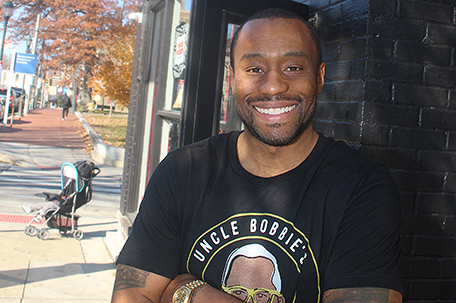
ABOVE PHOTO: Marc Lamont Hill proudly stands in front of the cafe’ honoring his late uncle…Uncle Bobbie’s Coffee & Books at 5445 Germantown Ave, (215) 403-7058.
(Photo: Robert Mendelsohn)
Through Uncle Bobbie’s Coffee & Books, author, academic and CNN commentator Marc Lamont Hill hopes to create a space where everyone can connect.
By Denise Clay
Thanks to Amazon.com and other online book outlets, there are fewer places to buy a book, curl up in a chair, and read it while grabbing a cup of coffee. Those spaces are even less prevalent in traditionally Black neighborhoods.
So when Marc Lamont Hill decided to add opening Uncle Bobbie’s Coffee & Books to a dance card that includes a professorship at Temple University, writing books, and appearing on CNN as someone who sometimes helps us understand a strange political world, everyone took notice.
Named for the uncle that inspired Hill’s love of reading, Uncle Bobbie’s is a place that’s warm, inviting and knows exactly where it’s coming from.
The SUN met Hill at the education center next door to the coffee shop to talk with him about his latest venture, the idea behind it, and the connections he hopes it fosters.
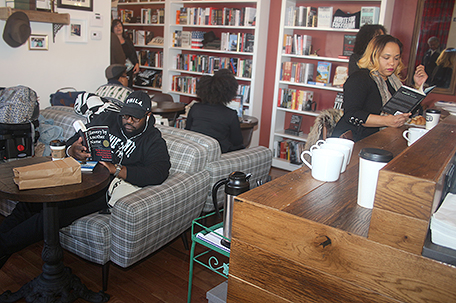
Patrons are already enjoying the reading selections at Uncle Bobbie’s. (Photo: Robert Mendelsohn)
SUN: Thanks for taking the time to talk with me today. What were the things that inspired you when creating this space?
MLH: I honestly just felt like it was time. I’ve always wanted to have a cool place for Black people to hang out. There was a place that I used to go to called the Crimson Moon.
SUN: I think we all went there. It was really popular and a nice place to hang out. When it closed, it made no sense to a lot of us…until we found out her rent was raised…
MLH: It was really unfortunate. But (the owner) Koko created something special there and it left a mark on me. The other part of it was the Black bookstore tradition. So Crimson Moon left a mark on me but so did Hakim’s on 52nd Street. So did Basic Black Books, Mahogany Books and the other Black bookstores in the Gallery. They left a mark on me, and I knew that I had an opportunity to recreate something and to create something new. And so, I said what would it mean to mean to mean to mash that stuff up, right? To take the best of Crimson Moon, the great coffee experience and great gathering spot and take the best of the Black bookstore tradition, the best of Hakim’s and Black and Nobel and all these places and put them together, but try to create a sustainable business model, so that I’m not just the cool spot for a week or two weeks, but something that people can enjoy for some time. That’s what I wanted.
SUN: Why did you decide to do this on Germantown Avenue?
MLH: We deserve cool stuff.
SUN: Of course we do…
MLH: But I feel like sometimes our business choices don’t reflect that. If I opened this near Chestnut Hill, people would be like,‘Yeah! Of course! Chestnut Hill!’If I opened it downtown, it would be like “Oh, yeah! 20th and Chestnut next to the clubs.’ But, Germantown deserves fly stuff. And Germantown has a need for it. You shouldn’t have to go to Chestnut Hill to get a great cup of coffee. You shouldn’t have to go to Amazon.com to get the book you want…You shouldn’t have to live in Rittenhouse to get a good book. So I said, let’s do something here. I live in Germantown. So why not build where I am? Isn’t that the Temple way? Acres of diamonds in your own backyard? Let’s dig, you know? So I thought that this would be a dope spot, and when I saw that this particular corner was open, it spoke to me. There were other places down the street, but that building, those windows and that corner spot? I walked in there and said‘I need to do this now!’ It wasn’t like I spent a year scouting for bookstores. I was perfectly fine doing TV and teaching and writing books and hitting the road. But I swear to God, I walked in that place and I was like‘That’s the spot that I need. This is where my bookstore is going to be. Bookstores are cool and it’s good for community education and learning and I think that we can do something special there.’
I also ran the numbers and I said that that this place doesn’t stand up without some serious revenue streams coming in. Coffee for me was a business choice, but it was also an ideological and political choice. I could have sold other things and it would have made sense. I could have sold pizza. I could have sold water ice. I could have sold other stuff, I could have serve alcohol and done other things to make people spend money because bookstores are a tough business.
SUN: Because people don’t read anymore, as sad as I am to say that…
MLH: They read differently. They read on the internet. They get their newspapers for free. They download books on Kindle. They watch the video of a lecture instead of going to it. There are all these ways in which our experience is just different. Literacy looks different. I don’t think that we consume less literacy or that we engage in literate activity any less. I think it’s that literacy looks different and it doesn’t present in a way that makes it easy to have a bookstore.
So I thought that I need to sell something else. That I need to do something else to create a functional model. But coffee was also deeply political and ideological. I travel around the world and I spend a great deal of time in the Middle East when I’m not here. And coffee is also the centerpiece of political discussion. It’s also something that connects many cultures from the Middle East to Africa, to Latin America to here. Coffee is part of people’s experience and coffee’s a community building tool, just like a book is. So why not coffee? Coffee and a book go so well together. Coffee and politics go so well together. So let’s do it! So I did that and I said now’s the time because I don’t know of any time where we needed community more.
SUN: Why is community so much more important now?
MLH: We’re in the Era of Trump. We’re fragmented. People are hurting. People are trying to figure the world out. People are vulnerable, and they’re disconnected, right? Social media is a great thing, but it also means that sometimes…If someone asks you if you’ve talked to someone, you can say ‘Oh, yeah! I talk to them all the time!’ On Facebook, we’re always online and it’s great to connect people. But it also means that I don’t get to physically experience people; I don’t get to experience community in the same ways. And there’s a great need for physical proximity. There’s a need to connect with people. The internet takes people who are really far apart and brings them closer together and takes people who should be close together and pulls them apart. So I wanted to make something that could bring us together and to maybe advance something bigger.
SUN: When you say that, what do you mean?
MLH: Community building, but also community education. Our slogan is ‘Dope People, Cool Books, Great Coffee.’ The first thing is cool people. I’m trying to advance this idea that we can…connecting and affirming each other’s value and doing it in real time. To me, that’s important. I think that makes us stronger. I think it helps us do better in resisting a dark moment. Black joy is resistance and creating Black joy is part of the political work we do. I hope that Uncle Bobbie’s creates some Black joy. But also community education. The room we’re in now is a community education center. The political work that I want to do in here is about community education. I want to create a place where the community can be empowered. To get ideas. To learn. You can go next door and get some books that I think may make your life better. But it’s not just about selling people books. You can come over here and get financial literacy. We’re going to do first-time homebuyers classes on a regular basis. We’re going to do financial literacy on a regular basis. We have youth poetry slams here. I am trying to help nurture the next generation of young poets. This will become a space where you can come in and experience art. Free films on Fridays for the community on topics that I think are interesting and engaging. We’re going to do author readings here. We’re going to have forums here and community groups can come here and meet. Grassroots organizations can meet here for free.
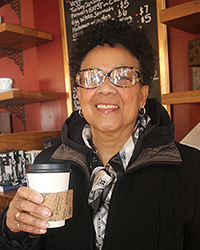
Philly jazz guitarist Monnette Sudler stops in for her coffee at Uncle Bobbie’s. (Photo: Robert Mendelsohn)
SUN: Are you surprised that it’s been as successful as it has?
MLH: I wouldn’t have opened it if I didn’t think it would be successful, but it has exceeded my expectations. Not everybody, but nine out of 10 people I talked to about this thought it was a bad idea. They thought it was a terrible idea. Because they didn’t think that Black people buy books. Bookstores are closing. You can’t beat Starbucks and Dunkin Donuts. They said Black people won’t support it. We don’t support our own businesses. Everything you would think. I just saw it differently.
SUN: So basically, you got every possible objection thrown at you…
MLH: Yeah. But it’s early. I’m not claiming victory, but what I thought would happen in terms of Black people supporting and expressing their hunger for books and community, all those things have happened. They’ve just happened faster and more intensely that I expected. And to be honest, every day when I walk in here, somebody walks up to me and says‘Thank you.’And I’m saying hey, I’m thanking y’all for coming and patronizing this business and they’re like thank you for building something that we can come to. Thank you for building a space to hang. Thank for building something where we can build with people and meet with people and share ideas and just feel like we’re at home. And I didn’t expect that.
SUN: My experiences with gentrification have always been that there are two ways that I can tell that I’m about to get priced out of my neighborhood: I see a coffee shop and I see a lot of people with dogs. Those are usually the indicators that tell me that I need to start looking for another place to live. The fact that you’re doing this here, in a neighborhood that’s kind of in-between…are you concerned about that?
MLH: I made a decision to make a space that everybody can come to, but that is clearly a Black space. If you look at my logo on the window, the cup with the mug with the kind of Black Arts Movement-style writing, the kind of DIY flavor, it adds a certain aesthetic. The big sign with my Uncle Bobbie’s face on it does not fit that aesthetic. I made a conscious choice to use that logo on Germantown Avenue so there would be a Black face on Germantown Avenue, marking it to some extent as a Black space. The books we choose, the fact that sweet potato pie is the primary dessert, that kind of stuff is…
SUN: That’s as Black as you can possibly get…
MLH: That’s unavoidably, unabashedly, unashamedly Black. And that’s how I wanted it. White people come in, and they’re welcome. And they’re having a great time and they’re feeling the community and enjoying the experience as well. But I wanted it to be clear that I wasn’t building a space so that gentrifiers could come in and swallow it up. The prices here are marked so that you can come in here and pay a $1.85 and get yourself a cup of coffee. I‘m not charging $8 for a slice of pie or $6 for a slice of pie like I could downtown or in Chestnut Hill. And if I priced it like that, I could change who comes in right away; you know, and make the same money, maybe more. But it was important for me to make everything from the menu to the pricing to the books to the music, I wanted it to feel like home to the locals to people who are indigenous to Germantown and indigenous to Philadelphia.
SUN: You named this bookstore after your late Uncle Bobbie, who inspired your love of books and learning. Do you think he’d be happy?
MLH: Yeah. Yeah, I do. Uncle Bobbie was born in 1917, there’s so much he didn’t get to see. He died in 1994, and I think about the things he didn‘t get to see. He would have wept at [President Barack] Obama’s election. He would have marveled at some of the achievements of Oprah Winfrey, or [outgoing American Express CEO] Ken Chenault. It would have been stunning to him to see some of the extraordinary things that have happened.
He was a hopeful person. I think he always thought the world could get better, but he had a critical eye, a critical analysis of the world. And I think that he would be happy to see that we’ve nurtured a space that advances the next generations of dreamers. The next generation of freedom fighters. The next generation of thinkers. He may have been a little uncomfortable with his face on the wall. He wasn’t vain in that way. I don’t think he would have needed for it to be called Uncle Bobbie’s. I think he would have been happy if it was called something else. He just wanted to see a space where Black people could be together and leave the world better than they found it. And to have a little joy while doing it. That would have made him happy.
Uncle Bobbie’s Coffee & Books is open Mon.-Thurs. 7AM – 9PM; Fri.7AM–11PM; Sat. 8AM-11PM; and Sun. 8AM – 7PM.





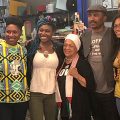
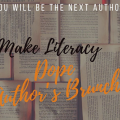
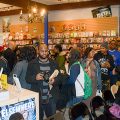









Leave a Comment